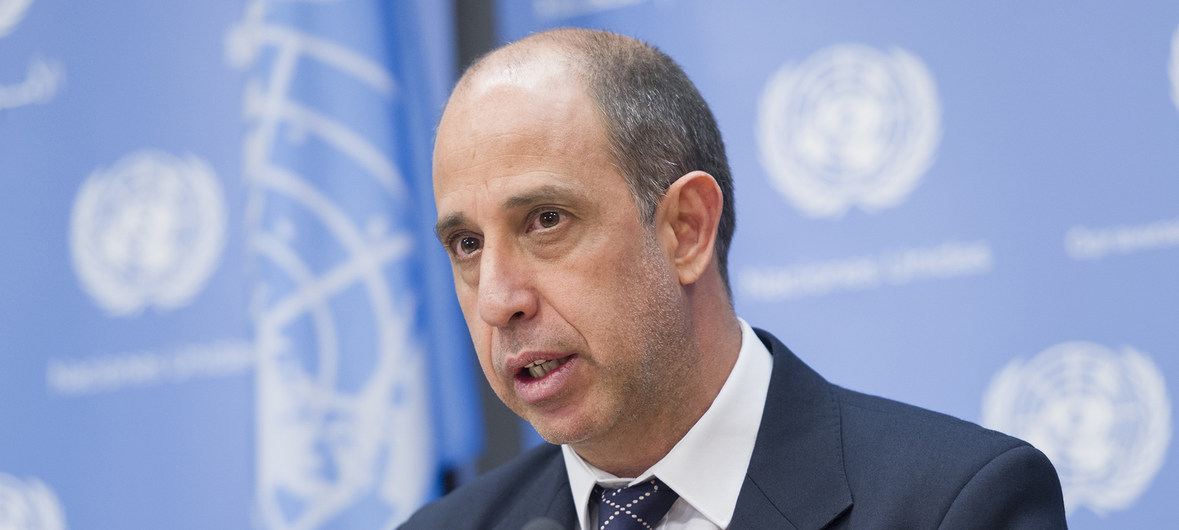[Herald Interview] UN expert questions political decision behind NGO audits
Special rapporteur on human rights in North Korea says Seoul’s argument for audits of defectors’ organizations is ‘unsatisfactory,’ UN mulling making a formal ‘communication’ on the issue
By Kim So-hyunPublished : Aug. 13, 2020 - 11:33

A UN expert on human rights in North Korea says he has not yet received a satisfactory response from the South Korean government as to why only human rights and defectors’ organizations are being targeted for office inspections and audits.
Tomas Ojea Quintana, UN Special Rapporteur on the human rights situation in North Korea, told The Korea Herald that he wants to understand the political decision behind the Unification Ministry’s plan to inspect 25 nongovernmental groups advocating human rights in North Korea, including 13 run by defectors, and audit dozens of others.
But he said that while a conversation with the ministry’s director general, Lee Jong-joo, clarified some of the finer points, the central question was not properly cleared up.
“The Ministry of Unification is making a lot of effort to comply with the (domestic) law, and I understand the technicalities, but my concern is about the political dimension. Why is it that at this precise moment, only human rights and defectors’ organizations are being targeted? (The ministry’s) response to this question was not satisfactory,” Quintana said in a telephone interview late Wednesday.
“We will continue to seek transparency from the government regarding this. Clearly, behind all this process, there is a political decision that I am trying to understand. That is why I recommended to the vice minister of unification, the political person, to put this process on hold, and have a dialogue with the organizations.”
The groups have requested for “a formal communication” that the UN can issue to a government on a specific issue, and the UN will soon decide whether to issue the communication after reviewing the legal details, according to the senior UN official.
The ministry’s decision to inspect the groups came a month after it canceled its approval for the incorporation of two activist groups that released balloons containing anti-Pyongyang leaflets and other items into the air, hoping they would fly across the border and reach North Koreans.
South Korean residents in the border areas have urged the activists to stop sending leaflets for fear of retaliatory attacks from the North.
Lee said in an earlier interview with The Korea Herald that the ministry's ban on flying the leaflets into the North was based on the basic principle of a democratic society that people should not risk the safety of others to pursue their own freedom.
Such “broad” statement about the safety of others is not accurate, Quintana said.
He pointed to Article 19 of the International Covenant on Civil and Political Rights that says everyone shall have the freedom of expression, and that this right can be restricted only when it compromises the reputation of others, or national security or public order.
“All governments (that signed the multilateral treaty) including the Republic of Korea should abide by that treaty. It is not a question of discretion. … To respect the reputation of others and to protect national security or public order -- those are the only two conditions that any government is allowed to argue when restricting freedom of expression,” he said, using the official name of South Korea.
“There is a need to analyze, to what extent does the sending of the pamphlets compromise the reputation of others or the national security of South Korea. This is the kind of debate that I want to see take place at the National Assembly.”
The UN official stressed that the government cannot select what kind of ideas can be disseminated.
“I’m not saying (the ministry’s reasons) are illegitimate conditions to restrict the sending of balloons. But the analysis should be very rigorous. … There must be some alternatives on how to respect the rights of those organizations that want to send information to North Korea,” he said.
As gaining access to information on human rights conditions in North Korea is a major challenge for the special rapporteur and his colleagues, he said he relies a lot on support from the human rights organizations.
The UN official said he has always supported humanitarian aid to North Korea, and has called for a two-track approach on the country -- to denounce serious human rights abuses and hold accountable those who commit human rights abuses; and at the same time seek dialogue with its authorities to discuss a peace agreement on the peninsula.
“My plan is to travel to North Korea, but that is not possible as the country does not accept the mandate,” Quintana said.
“So I plan to travel to South Korea, as soon as the conditions are met, to discuss issues such as the NGOs, and more importantly, to talk to the escapees from the North who bring their stories that will allow me to report accurately to the UN members and make recommendations.”
By Kim So-hyun (sophie@heraldcorp.com)








![[Graphic News] More Koreans say they plan long-distance trips this year](http://res.heraldm.com/phpwas/restmb_idxmake.php?idx=644&simg=/content/image/2024/04/17/20240417050828_0.gif&u=)
![[KH Explains] Hyundai's full hybrid edge to pay off amid slow transition to pure EVs](http://res.heraldm.com/phpwas/restmb_idxmake.php?idx=644&simg=/content/image/2024/04/18/20240418050645_0.jpg&u=20240419100350)






![[From the Scene] Monks, Buddhists hail return of remains of Buddhas](http://res.heraldm.com/phpwas/restmb_idxmake.php?idx=652&simg=/content/image/2024/04/19/20240419050617_0.jpg&u=20240419175937)

![[KH Explains] Hyundai's full hybrid edge to pay off amid slow transition to pure EVs](http://res.heraldm.com/phpwas/restmb_idxmake.php?idx=652&simg=/content/image/2024/04/18/20240418050645_0.jpg&u=20240419100350)

![[Today’s K-pop] Illit drops debut single remix](http://res.heraldm.com/phpwas/restmb_idxmake.php?idx=642&simg=/content/image/2024/04/19/20240419050612_0.jpg&u=)